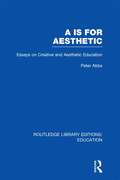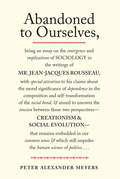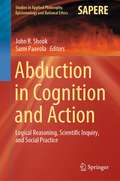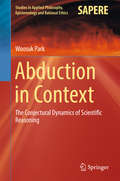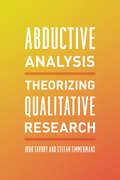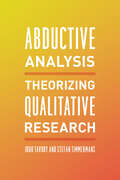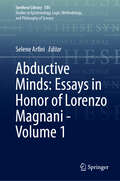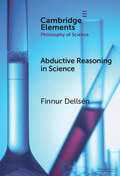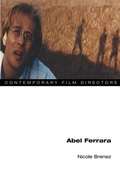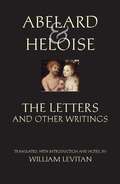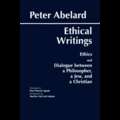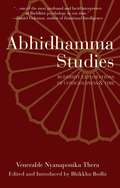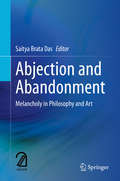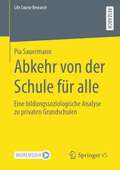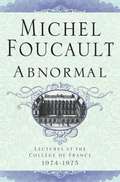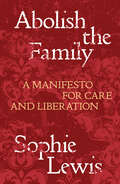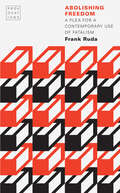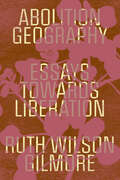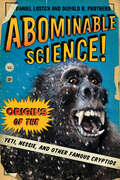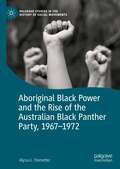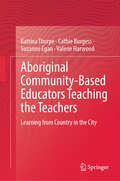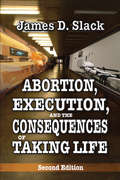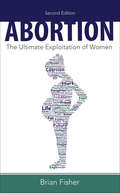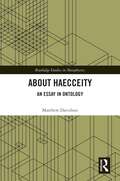- Table View
- List View
Aa is for Aesthetic: Essays on Creative and Aesthetic Education (Routledge Library Editions: Education)
by Peter AbbsThis volume reaffirms the indispensable place of the arts in any coherent curriculum. The author hopes that the specific arguments formulated in the book will advance the conservationist post-Modernist aesthetic.
Abandoned to Ourselves
by Peter Alexander MeyersIn this extraordinary work, Peter Alexander Meyers shows how the centerpiece of the Enlightenment--society as the symbol of collective human life and as the fundamental domain of human practice--was primarily composed and animated by its most ambivalent figure: Jean-Jacques Rousseau. Displaying this new society as an evolving field of interdependence, Abandoned to Ourselves traces the emergence and moral significance of dependence itself within Rousseau's encounters with a variety of discourses of order, including theology, natural philosophy, and music. Underpinning this whole scene we discover a modernizing conception of the human Will, one that runs far deeper than Rousseau's most famous trope, the "general Will." As Abandoned to Ourselves weaves together historical acuity with theoretical insight, readers will find here elements for a reconstructed sociology inclusive of things and persons and, as a consequence, a new foundation for contemporary political theory.
Abduction in Cognition and Action: Logical Reasoning, Scientific Inquiry, and Social Practice (Studies in Applied Philosophy, Epistemology and Rational Ethics #59)
by John R. Shook Sami PaavolaThis book gathers together novel essays on the state-of-the-art research into the logic and practice of abduction. In many ways, abduction has become established and essential to several fields, such as logic, cognitive science, artificial intelligence, philosophy of science, and methodology. In recent years this interest in abduction’s many aspects and functions has accelerated. There are evidently several different interpretations and uses for abduction. Many fundamental questions on abduction remain open. How is abduction manifested in human cognition and intelligence? What kinds or types of abduction can be discerned? What is the role for abduction in inquiry and mathematical discovery? The chapters aim at providing answer to these and other current questions. Their contributors have been at the forefront of discussions on abduction, and offer here their updated approaches to the issues that they consider central to abduction’s contemporary relevance. The book is an essential reading for any scholar or professional keeping up with disciplines impacted by the study of abductive reasoning, and its novel development and applications in various fields.
Abduction in Context: The Conjectural Dynamics of Scientific Reasoning (Studies in Applied Philosophy, Epistemology and Rational Ethics #32)
by Woosuk ParkThis book provides readers with a novel perspective on abduction. It starts by discussing the major theories of abduction, with emphasis on the hybrid nature of abduction as both inference and intuition. It reports on the Peircean theory of abduction and discusses the more recent Magnani's concept on animal abduction, connecting them to the work of medieval philosophers. Building on Magnani's manipulative abduction, the accompanying classification of abduction, and the hybrid conception of abduction as both inference and intuition, the book then examines the problem of visual perception, as it has been tackled by the author, together with the related concepts of misrepresentation and semantic information. It presents the author's views on caricature and the caricature model of science, and extend then the scope of discussion by introducing some standard issues in philosophy of science. By discussing the concept of ad hoc hypothesis generation as enthymeme resolution, the book demonstrates how ubiquitous the problem of abduction is in all different individual scientific disciplines. All in all, the book is a comprehensive text, providing philosophers, logicians and cognitive scientists with a historical, unified and authoritative perspective on abduction.
Abductive Analysis: Theorizing Qualitative Research
by Stefan Timmermans Iddo TavoryIn Abductive Analysis, Iddo Tavory and Stefan Timmermans provide a new navigational map for theorizing qualitative research. They outline a way to think about observations, methods, and theories that nurtures theory formation without locking it into predefined conceptual boxes. The book provides novel ways to approach the challenges that plague qualitative researchers across the social sciences--how to conceptualize causality, how to manage the variation of observations, and how to leverage the researcher’s community of inquiry. Abductive Analysis is a landmark work that shows how a pragmatist approach provides a productive and fruitful way to conduct qualitative research.
Abductive Analysis: Theorizing Qualitative Research
by Stefan Timmermans Iddo TavoryIn Abductive Analysis, Iddo Tavory and Stefan Timmermans provide a new navigational map for theorizing qualitative research. They outline a way to think about observations, methods, and theories that nurtures theory formation without locking it into predefined conceptual boxes. The book provides novel ways to approach the challenges that plague qualitative researchers across the social sciences—how to conceptualize causality, how to manage the variation of observations, and how to leverage the researcher’s community of inquiry. Abductive Analysis is a landmark work that shows how a pragmatist approach provides a productive and fruitful way to conduct qualitative research.
Abductive Minds: Essays in Honor of Lorenzo Magnani - Volume 1 (Synthese Library #505)
by Selene ArfiniThis book, the first of two volumes, provides novel perspectives on the study of abduction, by analyzing both Magnani’s ample investigation of the subject and discussing its rising importance in today’s epistemology and philosophy of science. Notwithstanding the long history of the concept, which has been studied since its analysis in Aristotle’s Organon, in the last fifty years, it has known a resurgent interest in the epistemological literature since it is an ampliative inference deemed to be at the core of creative leaps and acts of discovery. For these reasons, different open questions still bother interested researchers: which constraints affect abductive reasoning when a hypothesis is evaluated or selected? Should we adopt a unified view on abduction or maintain a pluralistic perspective regarding its forms and functions? What kinds of models can be used in abductive reasoning? This last question, in particular, shows how the topics of the two parts of the volume are intrinsically connected and ensures they are of great importance to those interested in epistemology, philosophy of science, mathematical logic and AI.
Abductive Reasoning in Science (Elements in the Philosophy of Science)
by Finnur DellsénIn abductive reasoning, scientific theories are evaluated on the basis of how well they would explain the available evidence. There are a number of subtly different accounts of this type of reasoning, most of which are inspired by the popular slogan 'Inference to the Best Explanation.' However, these accounts disagree about exactly how to spell out the slogan so as to avoid various problems for abductive reasoning. This Element aims, firstly, to give an opinionated overview both of the many accounts of abductive reasoning that have been proposed and the problems that have motivated them; and, secondly, to critically evaluate these accounts in a way that points toward a systematic view of the nature and purpose of abductive reasoning in science. This title is also available as Open Access on Cambridge Core.
Abel Ferrara (Contemporary Film Directors)
by Nicole Brenez Adrian MartinIn this concise study, Nicole Brenez argues for Abel Ferrara's place in a line of grand inventors who have blurred distinctions between industry and avant-garde film, including Orson Welles, Monte Hellman, and Nicholas Ray. Rather than merely reworking genre film, Brenez understands Ferrara's oeuvre as formulating new archetypes that depict the evil of the modern world. Focusing as much on the human figure as on elements of storytelling, she argues that films such as Bad Lieutenant express this evil through visionary characters struggling against the inadmissible (inadmissible behavior, morality, images, and narratives).
Abelard and Heloise: The Letters and Other Writings
by Heloise Stanley Lombardo William Levitan AbelardThe most comprehensive compilation of the works of Abelard and Heloise ever presented in a single volume in English, The Letters and Other Writings features an accurate and stylistically faithful new translation of both The Calamities of Peter Abelard and the remarkable letters it sparked between the ill-fated twelfth-century philosopher and his brilliant former student and lover--an exchange whose intellectual passion, formal virtuosity, and psychological drama distinguish it as one of the most extraordinary correspondences in European history. Thanks to this edition, Latin-less readers will be better placed than ever to see why this undisputed milestone in the intellectual life of medieval France is also a masterpiece of Western literature.In addition to the The Calamities and the letters--the first complete English translation of all seven in more than eighty years--this volume includes an Introduction, a map, and a chronology, Abelard's Confession of Faith, letters between Heloise and Peter the Venerable, the Introduction to The Questions of Heloise, and selected songs and poems by Abelard, among them a previously untranslated shaped poem, Open Wide Your Eyes. Extracts of lost letters sometimes ascribed to Abelard and Heloise are given in appendixes.
Abelard: Ethical Writings
by Paul V. Spade Marilyn Mccord Adams Peter AbelardAbelard's major ethical writings--Ethics, or Know Yourself, and Dialogue between a Philosopher, a Jew and a Christian, are presented here in a student edition including cross-references, explanatory notes, a full table of references, bibliography, and index.
Abhidhamma Studies
by Bhikkhu Bodhi Nyanaponika TheraThe Abhidhamma, the third great division of early Buddhist teaching, expounds a revolutionary system of philosophical psychology rooted in the twin Buddhist insights of selflessness and dependent origination. In keeping with the liberative thrust of early Buddhism, this system organizes the entire spectrum of human consciousness around the two poles of Buddhist doctrine - bondage and liberation, Samsara and Nirvana - the starting point and the final goal. It thereby maps out, with remarkable rigour and precision, the inner landscape of the mind to be crossed through the practical work of Buddhist meditation. In this book of groundbreaking essays, Venerable Nyanaponika Thera, one of our age's foremost exponents of Theravada Buddhism, attempts to penetrate beneath the formidable face of the Abhidhamma and to make its principles intelligible to the thoughtful reader of today. His point of focus is the Consciousness Chapter of the Dhammasangani, the first treatise of the Abhidhamma Pitaka. Basing his interpretation on the detailed list of mental factors that the Abhidhamma uses as a guide to psychological analysis, he launches into bold explorations in the multiple dimensions of conditionality, the nature of consciousness, the temporality of experience, and the psychological springs of spiritual transformation. Innovative and rich in insights, this book does not merely open up new avenues in the academic study of early Buddhism. By treating the Abhidhamma as a fountainhead of inspiration for philosophical and psychological inquiry, it demonstrates the continuing relevance of Buddhist thought to our most astute contemporary efforts to understand the elusive yet so intimate nature of the mind.
Abjection and Abandonment: Melancholy in Philosophy and Art
by Saitya Brata DasThis book provides a thorough and insightful examination of melancholy in philosophy and art. Since the advent of “philosophy,” the question of melancholy has been intimately connected with creativity. In addition, melancholy has taken on a new importance in contemporary discourses. Accordingly, this book revisits the fascinating question of how melancholy and creativity are linked in light of contemporary thought, and gathers studies from diverse disciplines, such as aesthetic theories, psychoanalysis, cultural theory, medical studies and sociological studies. All the contributions are trans-disciplinary in nature and will broaden readers’ understanding of various issues stemming from the question of melancholy. This book will be an indispensable read for scholars, researchers and practitioners in psychology, psychoanalysis, philosophy and related fields.
Abkehr von der Schule für alle: Eine bildungssoziologische Analyse zu privaten Grundschulen (Life Course Research)
by Pia SauermannVor dem Hintergrund eines expandierenden Privatschulsektors einerseits und der Konzeption der für allen gemeinsamen Grundschule andererseits untersucht die vorliegende Arbeit, ob private Grundschulen in Deutschland Bildungsungleichheiten verstärken. Betrachtet werden einerseits die Selektivität der Privatschulwahl und andererseits die Effekte, welche der Besuch einer privaten Grundschule auf die Kompetenzentwicklung hat. Beide Aspekte werden auf Basis von Daten des Nationalen Bildungspanels untersucht. Die Befunde weisen darauf hin, dass die Wahl einer privaten Grundschule insbesondere in städtischen Gebieten und in Ostdeutschland vom Bildungsniveau und vom kulturellen Kapital der Eltern abhängt. Wird die soziale Selektivität der Privatschulwahl berücksichtigt, zeigt sich kein Effekt privater Beschulung auf die Entwicklung von Lese- und Mathematikkompetenzen.
Abnormal: Lectures at the Collège de France 1974-1975
by Michel Foucault Graham Burchell Arnold I. DavidsonThe second volume in an unprecedented publishing event: the complete Collège de France lectures of one of the most influential thinkers of the last century Michel Foucault remains among the towering intellectual figures of postmodern philosophy. His works on sexuality, madness, the prison, and medicine are classics; his example continues to challenge and inspire. From 1971 until his death in 1984, Foucault gave public lectures at the world-famous Collège de France. These lectures were seminal events. Attended by thousands, they created benchmarks for contemporary critical inquiry. The lectures comprising Abnormal begin by examining the role of psychiatry in modern criminal justice, and its method of categorizing individuals who "resemble their crime before they commit it. " Building on the themes of societal self-defense in the first volume of this series, Foucault shows how and why defining "abnormality" and "normality" were prerogatives of power in the nineteenth century, shaping the institutions--from the prison system to the family--meant to deal in particular with “monstrosity,” whether sexual, phsyical, or spiritual. The Collège de France lectures add immeasurably to our appreciation of Foucault's thought, and offer a unique window on his singular worldview.
Abolish the Family: A Manifesto for Care and Liberation
by Sophie LewisWhat if we could do better than the family? We need to talk about the family. For those who are lucky, families can be filled with love and care, but for many they are sites of pain: from abandonment and neglect, to abuse and violence. Nobody is more likely to harm you than your family. Even in so-called happy families, the unpaid, unacknowledged work that it takes to raise children and care for each other is endless and exhausting. It could be otherwise: in this urgent, incisive polemic, leading feminist critic Sophie Lewis makes the case for family abolition. Abolish the Family traces the history of family abolitionist demands, beginning with nineteenth century utopian socialist and sex radical Charles Fourier, the Communist Manifesto and early-twentieth century Russian family abolitionist Alexandra Kollontai. Turning her attention to the 1960s, Lewis reminds us of the anti-family politics of radical feminists like Shulamith Firestone and the gay liberationists, a tradition she traces to the queer marxists bringing family abolition to the twenty-first century. This exhilarating essay looks at historic rightwing panic about Black families and the violent imposition of the family on indigenous communities, and insists: only by thinking beyond the family can we begin to imagine what might come after.
Abolishing Freedom: A Plea for a Contemporary Use of Fatalism (Provocations)
by Frank RudaPushing back against the contemporary myth that freedom from oppression is freedom of choice, Frank Ruda resuscitates a fundamental lesson from the history of philosophical rationalism: a proper concept of freedom can arise only from a defense of absolute necessity, utter determinism, and predestination.Abolishing Freedom demonstrates how the greatest philosophers of the rationalist tradition and even their theological predecessors—Luther, Descartes, Kant, Hegel, Freud—defended not only freedom but also predestination and divine providence. By systematically investigating this mostly overlooked and seemingly paradoxical fact, Ruda demonstrates how real freedom conceptually presupposes the assumption that the worst has always already happened; in short, fatalism. In this brisk and witty interrogation of freedom, Ruda argues that only rationalist fatalism can cure the contemporary sickness whose paradoxical name today is freedom.
Abolition Geography: Essays Towards Liberation
by Ruth Wilson GilmoreThe first collection of writings from one of the foremost contemporary critical thinkers on racism, geography and incarcerationGathering together Ruth Wilson Gilmore&’s work from over three decades, Abolition Geography presents her singular contribution to the politics of abolition as theorist, researcher, and organizer, offering scholars and activists ways of seeing and doing to help navigate our turbulent present. Abolition Geography moves us away from explanations of mass incarceration and racist violence focused on uninterrupted histories of prejudice or the dull compulsion of neoliberal economics. Instead, Gilmore offers a geographical grasp of how contemporary racial capitalism operates through an &“anti-state state&” that answers crises with the organized abandonment of people and environments deemed surplus to requirement. Gilmore escapes one-dimensional conceptions of what liberation demands, who demands liberation, or what indeed is to be abolished. Drawing on the lessons of grassroots organizing and internationalist imaginaries, Abolition Geography undoes the identification of abolition with mere decarceration, and reminds us that freedom is not a mere principle but a place. Edited with an introduction by Brenna Bhandar and Alberto Toscano.
Abominable Science!: Origins of the Yeti, Nessie, and Other Famous Cryptids
by Donald R. Prothero Daniel LoxtonThroughout our history, humans have been captivated by mythic beasts and legendary creatures. Tales of Bigfoot, the Yeti, and the Loch Ness monster are part of our collective experience. Now comes a book from two dedicated investigators that explores and elucidates the fascinating world of cryptozoology. Daniel Loxton and Donald R. Prothero have written an entertaining, educational, and definitive text on cryptids, presenting the arguments both for and against their existence and systematically challenging the pseudoscience that perpetuates their myths. After examining the nature of science and pseudoscience and their relation to cryptozoology, Loxton and Prothero take on Bigfoot; the Yeti, or Abominable Snowman, and its cross-cultural incarnations; the Loch Ness monster and its highly publicized sightings; the evolution of the Great Sea Serpent; and Mokele Mbembe, or the Congo dinosaur. They conclude with an analysis of the psychology behind the persistent belief in paranormal phenomena, identifying the major players in cryptozoology, discussing the character of its subculture, and considering the challenge it poses to clear and critical thinking in our increasingly complex world.
Abominable Science!: Origins of the Yeti, Nessie, and Other Famous Cryptids
by Donald R. Prothero Daniel Loxton&“A sharp analysis of the quest for unreal critters―cryptids, as they are called―and the people who pursue them . . . entertaining and thoroughly documented.&” —The Wall Street Journal Throughout our history, humans have been captivated by mythic beasts and legendary creatures. Tales of Bigfoot, the Yeti, and the Loch Ness monster are part of our collective experience. Now comes a book from two dedicated investigators that explores and elucidates the fascinating world of cryptozoology. Daniel Loxton and Donald R. Prothero have written an entertaining, educational, and definitive text on cryptids, presenting the arguments both for and against their existence and systematically challenging the pseudoscience that perpetuates their myths. After examining the nature of science and pseudoscience and their relation to cryptozoology, Loxton and Prothero take on Bigfoot; the Yeti, or Abominable Snowman, and its cross-cultural incarnations; the Loch Ness monster and its highly publicized sightings; the evolution of the Great Sea Serpent; and Mokele Mbembe, or the Congo dinosaur. They conclude with an analysis of the psychology behind the persistent belief in paranormal phenomena, identifying the major players in cryptozoology, discussing the character of its subculture, and considering the challenge it poses to clear and critical thinking in our increasingly complex world. &“As valuable for its analysis of the hunted as it is for the light it shines on the still-hopeful hunters.&” —Publishers Weekly &“Highly recommended for readers looking for scientific but accessible evaluations of the existence of five notable cryptids that have captured our imaginations.&” —Library Journal (starred review)
Aboriginal Black Power and the Rise of the Australian Black Panther Party, 1967-1972 (Palgrave Studies in the History of Social Movements)
by Alyssa L. TrometterExamining transnational ties between the USA and Australia, this book explores the rise of the Aboriginal Black Power Movement in the 1960s and early 1970s. Aboriginal adaptation of the American Black Power movement paved the way for future forms of radical Aboriginal resistance, including the eventual emergence of the Australian Black Panther Party. Through analysis of archival material, including untouched government records, previously unexamined newspapers and interviews conducted with both Australian and American activists, this book investigates the complex and varied process of developing the Black Power movement in a uniquely Australian context. Providing a social and political account of Australian activism across Victoria, New South Wales and Queensland, the author illustrates the fragmentation of Aboriginal Black Power, marked by its different leaders, protests and propaganda.
Aboriginal Community-Based Educators Teaching the Teachers: Learning from Country in the City
by Suzanne Egan Valerie Harwood Katrina Thorpe Cathie BurgessThis book showcases the transformative impact of Aboriginal community-based educators teaching local histories and cultures to preservice teachers. It details the &‘Learning from Country in the City&’ teaching and research project, which follows preservice teachers who participated in immersive &‘Learning from Country&’ experiences in undergraduate Aboriginal education electives through to their first few years of teaching. Through storying Aboriginal community-based educator, preservice and early career teacher, and lecturer experiences, this book demonstrates the educational and emotional impact of Aboriginal truth telling processes and the significance of connecting with and learning from Country for all teachers and students. A visual representation of the pedagogical framework articulates this work which is designed to capture localised place-based learning processes and apply these principles to diverse contexts. The book presents photographs and maps of the places at the centre of this learning so educators, community members and readers can visualise how they might apply this methodology to their context. Importantly, this book positions Indigenous Knowledges, Aboriginal voices and ways of knowing, being and doing front and centre - asserting that this is essential foundational work needed to prepare young people for living in an ever-changing world.
Abortion, Execution, and the Consequences of Taking Life
by James D. SlackThis book focuses on the relationship between public morality and personal action in the American political community. It emphasizes the responsibilities of citizens and government to find and confirm truth, looking to specific sources: religious scripture and empirical events. Recognizing that we have a natural preference for distraction and distance from both sources of truth, Slack uses qualitative, open-ended interviews and direct observation to uncover the intimate consequences of life-taking in open societies.Abortion and murder/capital punishment are instances in which there is a sequence of events that result in life-taking. The act of murder denies the sanctity of life of someone else. Abortion and capital punishment also deny the sanctity of the lives of others. The intimacy of life-taking is not typically acknowledged or remains hidden. This makes it difficult to assess the consequences for victims, survivors, and the political community as a whole. As a result, there is only a tenuous link between public actions that question the sanctity of human life and the moral compass professed by the American democracy.The volume presumes a theocentric foundation envisioned by the American Founders. It explores the model's first source of truth, biblical scripture, as it applies to the public actions of murder, abortion, and capital punishment. Then it investigates the intimate reality of these acts. These realities are examined in a variety of settings, resulting in a mosaic pattern of public action about capital punishment and abortion. Slack underscores the importance of government's role of providing outward justice, as well as the citizen's responsibility to be supportive of government tasks in order to reconcile the reality of life-taking with the moral compass professed in the American political community.
Abortion: The Ultimate Exploitation of Women
by Brian FisherThe author of Deliver Us from Abortion presents a five-point plan for men to put an end to abortion in America for women, men, and family.Do men have a stake in the abortion debate? Modern culture says no but author Brian Fisher shows why men are very much an interested party. Men led the campaign to legalize abortion—harming and exploiting women in the process. Now, he says, men must lead the effort to end the exploitation by ending abortion. And he presents a plan to do so. This revised and expanded second edition presents a more complete picture of how men target and exploit women globally, how this oppression is deeply connected to abortion, and how men can be, are, and should be a part of the solution.
About Haecceity: An Essay in Ontology (Routledge Studies in Metaphysics)
by Matthew DavidsonThis book offers an in-depth and updated examination of the nature of haecceity—that primitive entity which explains why something is distinct from other things.The book begins by exploring different conceptions of haecceity throughout history. The discussion of various figures across history is important for getting clear on the nature of haecceity and its role in individuation. The next part of the book examines different views about the nature of haecceity. The author defends a view on which haecceities have objects that instantiate them as constituents. Following that, the book considers arguments for and against the existence of haecceities, the epistemology of haecceity, and the distinction between qualitative and non-qualitative properties.About Haecceity will appeal to scholars and advanced students working in metaphysics, philosophy of language, epistemology, logic, and history of philosophy.
